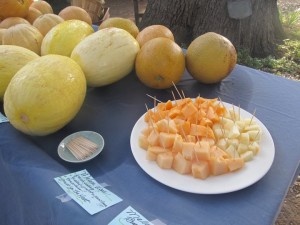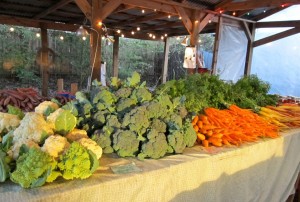Action Alert (Texas): Call Governor Perry to Sign Local Food Bills
Updated June 5, 2013:
The Texas Legislature passed three important local foods bills: the cottage foods bill (HB 970), the farmers’ market bill (HB 1382), and the DSHS Better Communications bill (HB 1392). These bills make it easier for local farmers and food producers to raise and sell healthy, local foods.
There is one last hurdle before these bills can become law: Governor Perry. The Governor has three options on each bill: (1) sign the bill, and it becomes law; (2) veto the bill, and it dies; (3) do nothing, and the bill will become law without his signature. He has until Sunday, June 16 to sign or veto the bills.
Please make one last call about the local foods bills. Call Governor Perry and urge him to sign all three local foods bills: HB 970, HB 1382, and HB 1392.
Your calls truly do make a difference. These bills faced opposition from some powerful players at the Legislature, including the Texas Retailers Association and the Texas Municipal League. Your voices outweighed their money and influence. Please help us in this final stretch!

A short description of the bills is at the end of this alert, and we will post additional information soon.
TAKE ACTION
Please make one last call about the local foods bills. Call Governor Perry at 512-463-2000 and urge him to sign all three local foods bills: HB 970, HB 1382, and HB 1392.
You can also send Governor Perry a message online at http://governor.state.tx.us/contact
MORE INFORMATION

You can click on the links for each bill to go to the legislative website, which includes information about the bill authors and the actual text of the bills.
We will post a more detailed explanation of each bill, including answers to frequently asked questions, within the next couple of weeks. Check our main Texas Local Foods page for updates.
HB 970 – Encouraging home-based food production, aka “cottage foods”: Until last year, anyone making and selling any food at all (other than uncut fruits and vegetables) had to do so in a commercial, licensed facility that was subject to regulations designed for large-scale industrial food production. Last session, the Texas Legislature provided that “cottage food producers” could make specific low-risk foods in their homes and sell directly to consumers, up to $50,000 per year, without being regulated by the state and local health departments.
The bill has led to the establishment and growth of numerous small businesses in this state, with no reports of resulting foodborne illness. HB 970 expands the law to include other foods designated as non-potentially hazardous by the FDA. The bill also removes the restriction that the sale has to occur at the person’s home, allowing the seller and buyer to connect at farmers markets, farm stands, and nonprofit community events.
 HB 1382 – Making it easier to provide samples at farmers markets and farm stands: Letting potential customers sample food is a great way to increase sales and encourage people to try unusual fruits and vegetables. But current regulations that govern food samplings are based on the conditions in brick-and-mortar facilities and pose unnecessary challenges for farmers and food producers at local farmers’ markets.
HB 1382 – Making it easier to provide samples at farmers markets and farm stands: Letting potential customers sample food is a great way to increase sales and encourage people to try unusual fruits and vegetables. But current regulations that govern food samplings are based on the conditions in brick-and-mortar facilities and pose unnecessary challenges for farmers and food producers at local farmers’ markets.
HB 1382 provides clear, reasonable standards for sampling at farmers’ markets and farm stands. The bill also clarifies the standards for cooking demonstrations at farmers’ markets, and exempts educational cooking demonstrations from permit fees.
 HB 1392 – Directing the DSHS to respond to inquiries about the law and its application to specific factual situations: Farmers and small-scale food producers have faced serious problems because of the inability to determine what is actually required under the regulations. When asked, the Department of State Health Services (DSHS) provides little guidance, leaving the producers to decide whether to invest anywhere from several hundred to tens of thousands of dollars and potentially still face fines depending on the department’s discretion. HB 1392 directs DSHS to respond to inquiries about how the law applies to a farmer’s or food producer’s specific facts within 30 days, so that they can comply with the law in good faith.
HB 1392 – Directing the DSHS to respond to inquiries about the law and its application to specific factual situations: Farmers and small-scale food producers have faced serious problems because of the inability to determine what is actually required under the regulations. When asked, the Department of State Health Services (DSHS) provides little guidance, leaving the producers to decide whether to invest anywhere from several hundred to tens of thousands of dollars and potentially still face fines depending on the department’s discretion. HB 1392 directs DSHS to respond to inquiries about how the law applies to a farmer’s or food producer’s specific facts within 30 days, so that they can comply with the law in good faith.